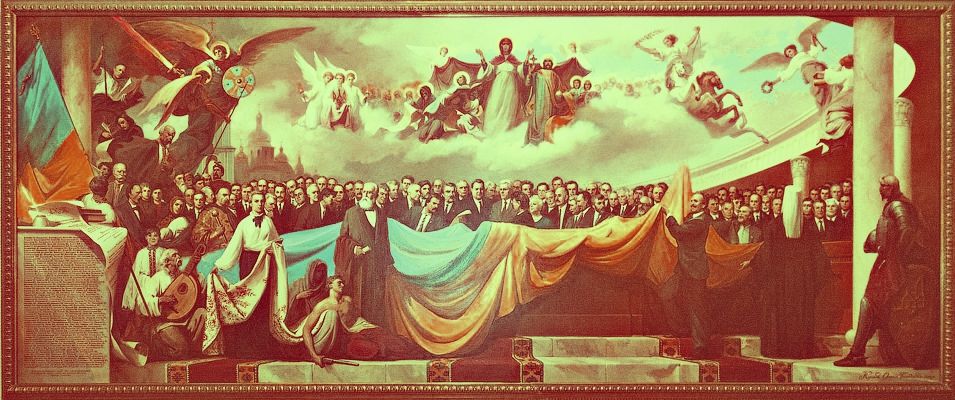

The parliamentarian history of an independent Ukraine is relatively very short (only 25 years). Yet it compensates its youth with the intensity of events. Within eight incomplete convocations, 3 813 people have served as MPs. They have initiated 24 6871 draft laws, 4 0091 of which have been passed into laws. Ukraine’s parliaments have been dissolved prematurely twice, by Viktor Yushchenko on June 5, 2007 and by Petro Poroshenko on August 25, 2014. However, there facts lie on the surface, while we want to reveal something more interesting.
Which parliament was the most hardworking and productive and which was the most united? What kind of legislative relations have various presidents and parliaments had? In Ukraine, the answers to these questions are often given in the form of subjective views by experts. VoxUkraine has analyzed more than 20 years of Parliament’s activities in a different manner: by using Open Data2 and some statistics.
In this article, we invite our readers to consider 5 non-obvious facts from the parliamentarian history in Ukraine which can shed light on the aforementioned issues.
Given the absence of the detailed information about the first two convocations, our history of Ukrainian parliamentarianism focuses on the period between March 1998-August 2016 (III-VII convocations of the Ukrainian parliament).
If MPs were to be paid for the number of votes that they take part in, the MPs of the 6th convocation would earn the most, for their work during the 9th session in September-December 2011. In that period, the parliaments voted on average 100 times daily. The second half of the 6th convocation was marked by the domination of the parliament by the Party of Regions (in a coalition with the Communists and the Lytvyn’s Bloc). They managed to virtually automatize the voting procedure and make the parliament work very quickly.
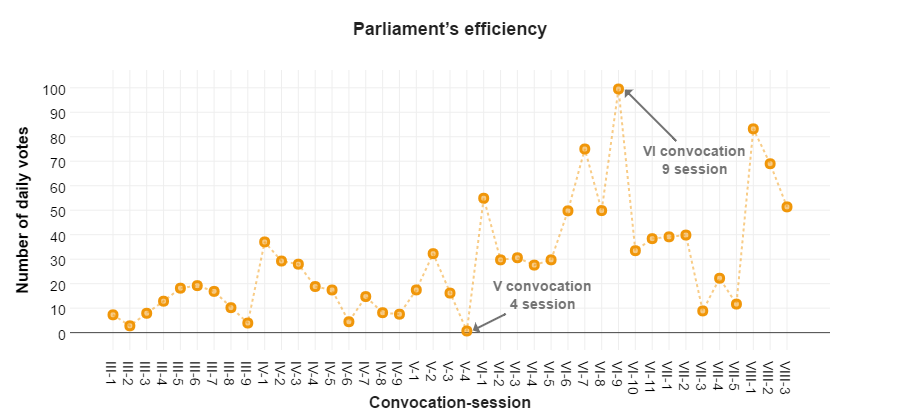
The 4th session of the 5th convocation was the least productive period, when less than one vote occurred daily. On the whole, the 5th convocation stands out as relatively inefficient, given the permanent parliamentarian crisis. Yulia Tymoshenko’s Bloc, "Our Ukraine" and the Socialist party have failed to maintain the Coalition of democratic forces, which led to the exit of the Socialists and their alliance with the Party of Regions and the Communists. This is how the Anti-crisis coalition came into being. Yet it also failed to last for long because of a stand-off between the president and the parliament. The conflict led to an early election in 2007.
Let us look at how productivity has changed during convocations. The first session has been the most productive in each convocation (in terms of the number of daily votes). 38 votes occurred daily compared to 19 during other sessions. It is possible that, by their activity during the first session, MPs strive to demonstrate their professional competence to their electorate or, which is more likely, to pass the most beneficial (to them and their sponsors) laws. Their fervor fades in the next sessions, while the number of conflicts within and between parties increases, which leads to a lower number of votes.
A good way to increase the productivity of MPs is to call an election after a continuous political crisis or revolution. It was the MPs of the 6th and 7th convocations who voted most often. The average number of daily votes in the 6th and 7th convocations was 47 and 68 correspondingly, while MPs of other convocations have voted no more than 24 times daily.
How supportive is the parliament of the presidential legislative proposals or how much influence does the president have on the main legislative body of Ukraine? The answer can be found by looking at the share of the presidential legislative proposals that was supported by the parliament and at how quickly the parliament processed them.
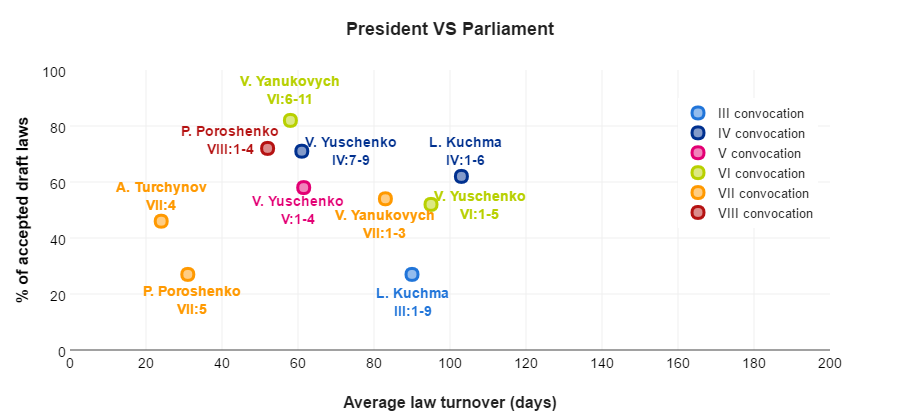
Let us look first at Leonid Kuchma and the 3rd convocation of the parliament. During the 3rd convocation Leonid Kuchma did not count on the unequivocal support by the parliament. A mere 27% of presidential initiatives were passed into law, while it took 3 months (90 days) for a draft law to be signed by the president after its registration of the draft law in the parliament. The situation has improved in the 4th convocation, when the share of the supported draft laws increased to 62%, yet the process was even longer (103 days).
During his presidency, Viktor Yushchenko managed to set an interesting record as he worked with three different convocations of the parliament: 4th, 5th and 6th convocations. Yet the level of support of the president by the parliament continuously decreased. At first, his numbers were superior to those of his predecessor (71% of supported draft laws and 71 days from the registration till the signing by the president). In the wake of the parliamentarian crisis of the 5th convocation, the level of support dropped to 58%. After the parliamentary re-election, the numbers dropped further (52% of supported proposals and 95 days between the registration and signing of the law).
Viktor Yanukovych, together with the Party of Regions, has demonstrated incredible results: 82% of supported draft laws and less than 2 months turnover (58 days). The 6th-11th sessions of the 6th convocation can be seen as the golden era of the Party of Regions, as its members served as the president and prime minister and formed the majority in the parliament.
After the 2012 election, the monopolization of power by the Party of Regions intensified, yet a decrease in the support for the presidential legislative proposal shows that the struggle within the party was on the rise. As a result, only 58% of presidential draft bills were passed into law.
After the Revolution of Dignity, the 7th convocation has lasted for two more sessions (4th and 5th)and has formally worked with two more different presidents, Interim President Oleksandr Turchynov and President Petro Poroshenko. It is not appropriate to assess the level of support they received from the parliament as the legislature understood that its tenure was approaching the end, while many legislative proposals were passed into law in view of the "revolutionary expediency".
During the 8th convocation, the incumbent President Petro Poroshenko has demonstrated impressive results. 72% of his legislative proposals are passed into law, which also occurs with a record speed, as it takes just 52 days for a draft law to be signed after its registration in the parliament. It is too early to make a conclusion about the parliamentary loyalty to Poroshenko. Only four sessions have passed in the 8th convocation, hence the level of the parliamentary support of the president might still fall.
The share of draft laws that either were returned to their author(s) for revision or were refused or discarded at all has risen from 28% to 88% of all proposals in 16 years. The major part of this change happened during the 5th convocation, when 60% of all proposals were returned to their author(s) for revision. In the 6th and 7th convocations, 70% and 86% of draft laws were discarded without any parliamentary discussion. It is too early to speak about the results of the 8th convocation in this respect, as more than the half of draft laws are waiting for being reviewed and are currently in the committees.
The share of draft laws that are passed into law ranges from 10%-20%. The 4th and 6th convocations were the most generous, having voted in favor of 20% of draft laws. The 5th and 7th convocations, which were dissolved by the president, were the least productive in this sense (11.7% and 9.53%).
Is it possible to assess how consolidated the parliament is? Yes. For instance, it is possible to calculate the Rice Index, which evaluates the faction discipline in the US Congress. The Rice Index is calculated as the ratio of the difference between the number of votes "In favor" and "Against" to the sum of the votes "In favor" and "Against".
The problem is that Ukrainian MPs have more than two options when they vote. They can vote "In favor", "Against" or "Abstain", or not vote at all (even while being present) or be absent. Therefore, we have modified the index in two ways. Firstly, we have applied it to the whole parliament and not to separate factions. Secondly, we have calculated the difference between the number of votes "In favor" and all other options ("Against", "Abstain", "No vote", "Absent"). This change is explained by the fact that Ukrainian MPs rarely do press the button "Against", preferring not to vote at all, if they do not support a proposal.
The Rice Index ranges from 0 to 1, where 1 means that the parliament is extremely consolidated (i. e. all MPs either support or decline a draft law) and 0 means that the parliament is split in half (50% of MPs support a draft law, while 50% do not support it).
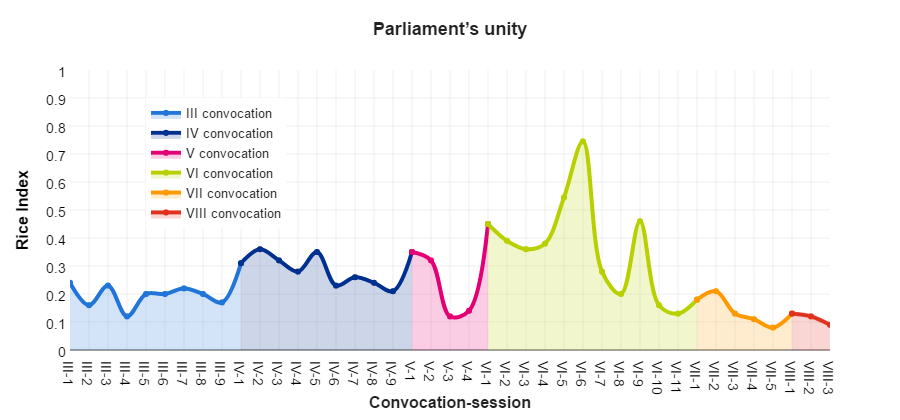
An unexpected revelation is that the 8th convocation of the parliament has been the most polarized parliament, at least in the period since 1998. The Rice Index after three first sessions equals 11%. This means that the parliament is de facto split in two almost equal parts, a de facto coalition and a de facto opposition. The former supports a draft law, while the latter declines it.
The first parliament that was controlled by the Party of Regions was the most consolidated (6th-11th sessions of the 6th convocation). In the spring of 2010, after the 6th session, the Index rose to the record level of 0.75.
The incumbent parliament of the 8th convocation has set yet another record. It has been the most productive and the most active in comparison to previous convocations. On average, more than 1000 draft laws have been initiated in each session of the 8th convocation. This is an absolute record. However, most draft laws do not make it to the parliamentary floor, either ending in the committees or being returned to the author(s) for revision. Even those draft laws that are included in the parliamentary agenda can be filtered out at the stage of voting for them.
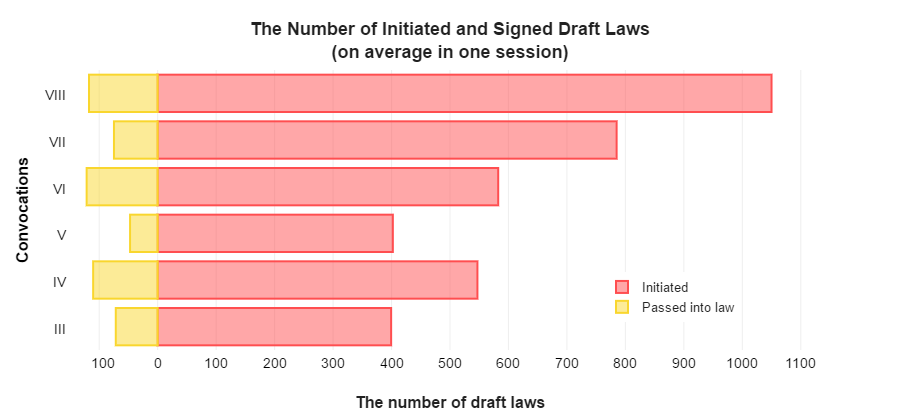
The dynamics of signed laws has been more stable. On average, the president signs about 70 laws during one session. The lowest number of laws was signed during the crisis-ridden 5th convocation, which lasted for a bit more than one and a half years and was dissolved by Viktor Yushchenko in 2007. About 47 draft laws were passed into law in each session. The 6th convocation demonstrated better results as 20% of draft laws were accepted.
The first four sessions of the 8th convocation have demonstrated that the incumbent parliament is more productive than previous parliaments, as more draft laws are introduced and more votes occur. However, we should not be too optimistic, as this proves nothing in what concerns the quality of MPs’ work. Its quality is determined by the laws they initiate and vote for. Therefore, a further analysis of the history of the Ukrainian parliamentarianism is yet another step in the understanding of how an effective parliament should work and what should be done to increase its quality.